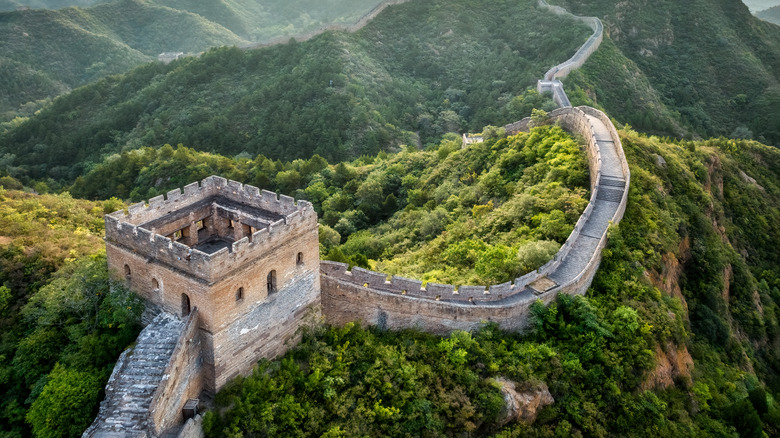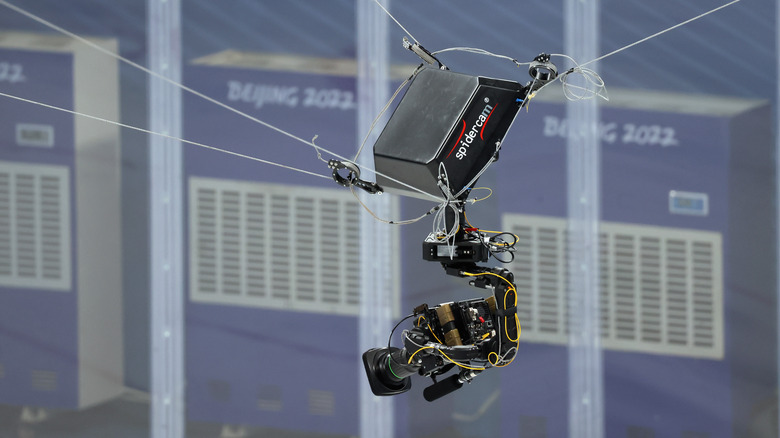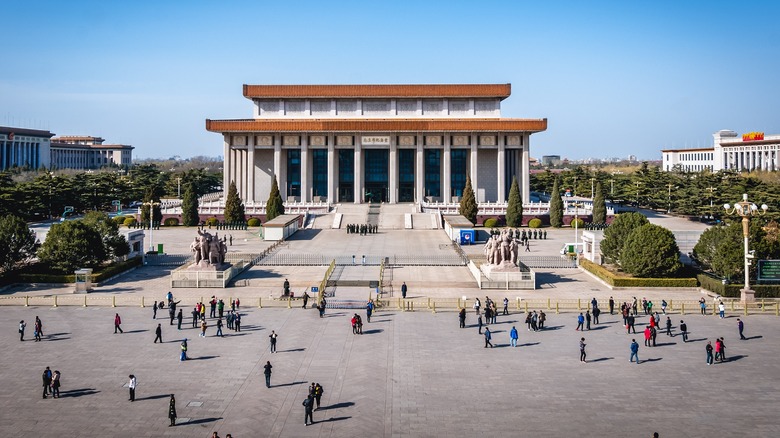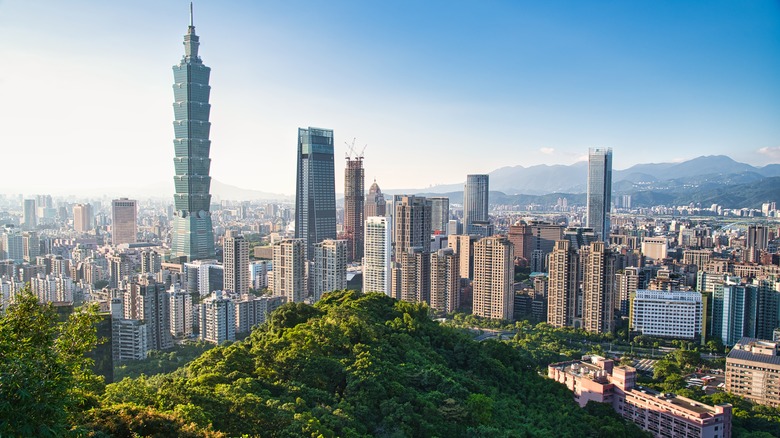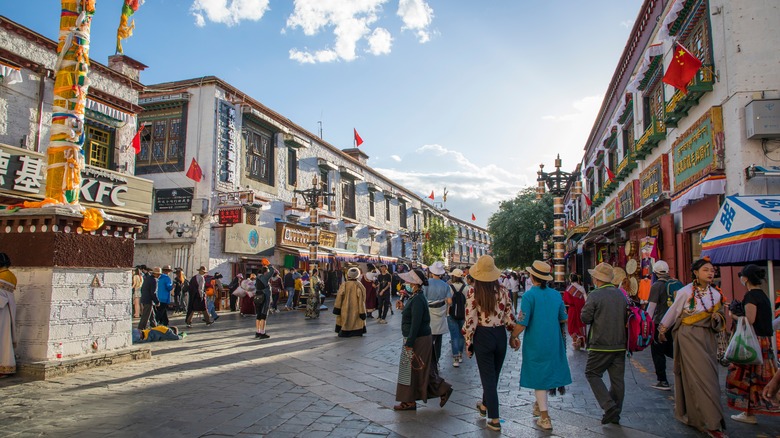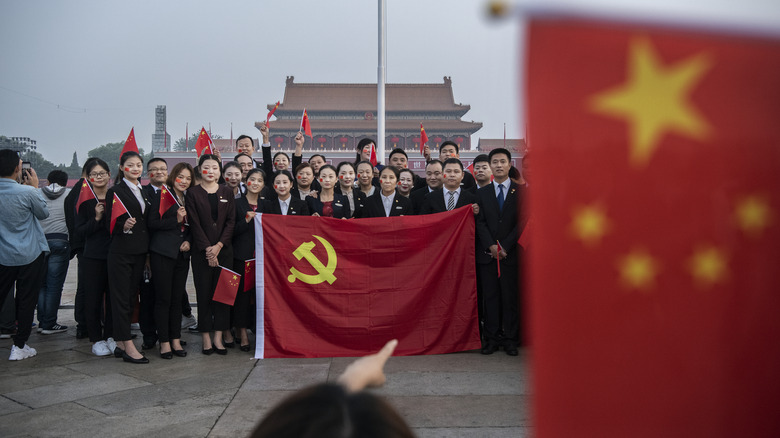The 'Three Ts' Tourists Need To Avoid Bringing Up While On A Trip To China
Traveling to China can be the trip of a lifetime. Steeped in incredible history, myriad cultures, and dumplings you'll dream about forever, it is truly an experience not to be missed. However, there are some things that travelers should, well, not talk about while in the country. Especially for American visitors, the censorship and surveillance can be jarring. The Chinese Communist Party is known for keeping things under wraps, which is why you should never talk about things like Tiananmen Square, Taiwan, or Tibet.
In China, sites like Google aren't available without a VPN. Information is hard to come by for a reason. And, as China's strict internet infrastructures continue to spread, it's unlikely that these practices will change. This censorship is important for visitors to comprehend. Without access to information not controlled by the ruling party, a lot of things are unknown or faintly known by the public. Because of that, these topics can be confusing, enraging, and even potentially dangerous for a traveler to talk about.
Having spent time in China, we recognize the potential for unsafe travel practices. But also, because we have been to and experienced these things in China, we don't want to scare you away from your visit. Cultural nuance is part of what makes travel enlightening. It's vital to understand these topics are cultural, societal, and even legal hurdles. And, if it's your first time visiting China, you should also know about the specific article of clothing tourists should avoid wearing.
Understanding surveillance and security practices in China
One of the things travelers must know about China is that you are always under surveillance. It is believed that, as recently as March 2023, China had over 700 million surveillance cameras. If you look around any public space, you'll spot cameras. This system is referred to as Skynet, and many of the cameras have facial recognition technology. According to the Economist, the government has also implemented voice-collecting and phone-tracking devices, so the level of surveillance goes above and beyond just image gathering.
These surveillance tactics, on top of seemingly random law enforcement, make staying quiet on taboo topics even more important. The State Department emphasizes the unfair treatment of citizens and travelers alike. They also discuss not participating in activities that the People's Republic of China may consider a protest: "Participating in demonstrations or any other activities that authorities interpret as constituting an act of secession, subversion, terrorism, or collusion with a foreign country could result in criminal charges. Be aware of your surroundings and avoid demonstrations."
It would not be a stretch to say that openly discussing hot-button political topics like Tiananmen Square could be considered subversive. Know that you are always being watched or even listened to (hotel rooms are likely bugged) and may not get a fair shake with the law, so stick to talking about the day-to-day.
The history of Tiananmen Square
On June 4, 1989, an unknown number of people (perhaps as many as 10,000) were killed when the Chinese Communist Party sent soldiers and tanks to break up the protests in Tiananmen Square. It is a tragedy recognized by many around the world. This event is still heavily scrutinized by the ruling party. People have gone to prison for holding vigils there.
Talking about it or writing about it is not allowed and could lead to arrest. Louisa Lim, senior lecturer at the Centre for Advancing Journalism at the University of Melbourne and author of "People's Republic of Amnesia – Tiananmen Revisited," told University World News how volatile the subject became: "The Chinese government has succeeded in making knowledge dangerous and succeeded in seeding that idea that knowledge can have a price and that price could be too high."
Although you shouldn't talk about the events of June 4, you absolutely should visit the square — though, avoid the first week in June. The world's largest public square, this area houses so much history. From the magnificent Forbidden City to the Qianmen Gate, Chairman Mao's Memorial Hall, and the Monument to the People's Heroes, it is worth seeing.
Understanding the topic of Taiwan
When journalist Eveline Chao arrived in Beijing for her first day of work, she learned about the "Three T's" and wrote about her experience in a Foreign Policy article. One of the Ts being Taiwan, and all three were topics not to be discussed in Chinese media. To help explain the severity of the situation, the magazine's in-house censor told Chao a story about a journalist she knew. "A photo enthusiast, he once ran a picture he'd taken in Taiwan alongside an article, but had failed to notice a small Taiwanese flag in the background," Chao wrote of the story. "As a result, the entire staff of his newspaper had been immediately fired and the office shut down."
That is because of the tense relationship between Taiwan (the Republic of China) and mainland China (the People's Republic of China). Taiwan is a separate entity from the mainland, with its own government, so it is not politically controlled by the ruling party. In fact, the country is a democracy, which puts it directly at odds with the Chinese Communist Party. As such, it is an issue visitors should not discuss while in China — in private or otherwise.
At the time of publication, China was engaging in drills and circling Taiwan for potential military action. Per Reuters, the ruling party in China does not see Taiwan as a legitimate, separate entity and is trying to force an annexation of the country.
What Tibet means to China
Tibet has long been an autonomous region of China. Even so, there is also a lot of tension between Tibetans and the Chinese government, in part because the party exiled the country's spiritual leader, the Dalai Lama. The ruling party in mainland China has even been moving away from the English version of the country's name, Tibet, and calling it by its Mandarin name "Xizang."
"The Chinese government was desperate enough to propagate Xizang to create a Tibet of Chinese characteristics which is unknown to the world," Tenzin Lekshay, a spokesperson for the exiled Central Tibetan Administration, told Newsweek. "This time, the Chinese government is rigorous in changing the name in all the official records and communications, which is strictly designed to fulfill their political ambition of legitimizing their claim over Tibet by dividing and annihilating Tibet."
By the same token, it's probably best to avoid talking about the Dalai Lama, too. As a leader of Tibet and a worldwide cultural figure, he is seen as a separatist in the eyes of the Chinese government. Per CNN, it infuriates the ruling party when the Dalai Lama is elevated as a head of state, and his position is viewed in direct opposition to China's sovereignty over Tibet. It should be noted that this sovereignty is different than the situation in both Hong Kong and Macau, which are special administrative regions of China.
Practices not accepted by the Chinese Communist Party
While there's plenty to know about visiting China, including bits of etiquette up to and including cleaning your plate, what you shouldn't talk about in China extends far beyond the Three Ts. In fact, it's best to avoid any topics that could be considered political in any way. That is particularly true if the topic goes against anything the Chinese Communist Party stands for. It's worth remembering that the protestors in Tiananmen Square in 1989 were there fighting for free speech, free press, and democracy. Needless to say, the attitude against these topics is firm. Going beyond just speaking about them, the government has also been known to delete blog posts and even texts on banned issues, the State Department notes.
In 2017, there was a government directive titled "The Current Situation of the Ideological Front," which listed seven topics that should not be discussed or taught. All seven issues should be considered part of the "do not talk about" list. Per The World, these topics included universal values, freedom of speech, civil rights, civil society, crony capitalism, judicial independence, and the historical errors of the Chinese Communist Party. If your conversation is about to veer into any topic that remotely aligns with these issues or the Three Ts, it's best to save it for when you return.
